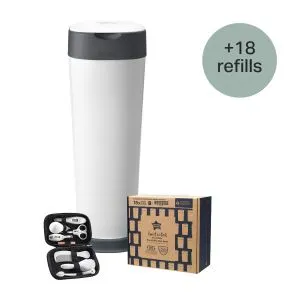
Ultimate XL Nappy Disposal Bundle with 18 Refills
Bundle & Save 40%
Subscription orders can be cancelled at anytime. Free delivery on all subsequent subscription orders. Find out more about subscriptions.
They’re easy and fuss free
Your products are automatically sent to you
You save up to 10% when you sign up for a subscription
You can cancel at any time
A Guide to Newborn Constipation

Constipation is a common issue in young babies and happens when their developing digestive system disagrees with what they’ve consumed.
We know that it's totally normal for parents to worry about their newborn's poop, so we've written this guide for new parents to help you understand how and why constipation occurs.
In it, we'll also cover the signs of newborn constipation you should look out for and teach you some top tips for helping a baby who's struggling with the uncomfortable symptoms of constipation.
There are a few signs that you can look out for if you suspect your newborn is constipated. Let’s run through them one by one.
Your baby may be constipated if they:
You may also notice that their poos are larger than usual or look like firm pellets that are dry and hard.
If you have any concerns about your newborn's bowel movements or are worried that they may be constipated, it's always a good idea to speak to your GP, midwife, or health visitor.
Constipation is when it's difficult for a baby to poo or when they don’t poo as often as normal. Your newborn may be constipated if they have not pooped more than three times in a week and are presenting some of the symptoms that we covered earlier.
Constipation can be uncomfortable for babies, but luckily, there are a few things that parents can do to help their baby poop and get some relief.
Massaging a baby's tummy in a clockwise direction when they're constipated can help get things moving. Make sure that your hands are clean and warm, then lay your baby on their back and gently rub their tummy with your fingertips.
You can also try gently bending their knees towards their chest and holding for a few seconds before releasing. This can help to relieve gas and stimulate bowel movements. It's important to be gentle and not apply too much pressure as babies are delicate and their tummies are sensitive.
'Bicycling' a baby's legs backwards and forwards while they lie on their back is recommended to help their digestive system work as it should and can help constipated babies release wind, remove uncomfortable trapped gas, and hopefully make it easier for them to poop.
A nice soak in a warm bath can soothe stomach pains and relax a constipated baby's body into releasing trapped poop.
You should never give your baby laxatives to treat constipation unless your GP prescribes them. The best thing to do is make sure your baby is getting enough fluid from their breast milk or formula feeds.
Now that we've covered how you can help your baby if they're constipated, let's take a look at why babies sometimes become constipated in the first place.
If you're breastfeeding, a change in your diet can sometimes influence your baby's bowel movements.
A baby may also become constipated if they switch from being fed breast milk to having infant formula, although this should settle once their body gets used to digesting new things. If you're formula feeding, it's important to follow the on-pack guidelines closely to avoid constipation.
A lack of fluids can make a baby's poo harder and more difficult to push out, and this can lead to constipation. Parents must keep a close eye on their baby’s fluid intake, especially if they’re constipated.
As with all aspects of baby healthcare, you should always trust your parenting instinct if you're concerned that your baby may be constipated, and you should speak to your medical care team as soon as possible if your baby: